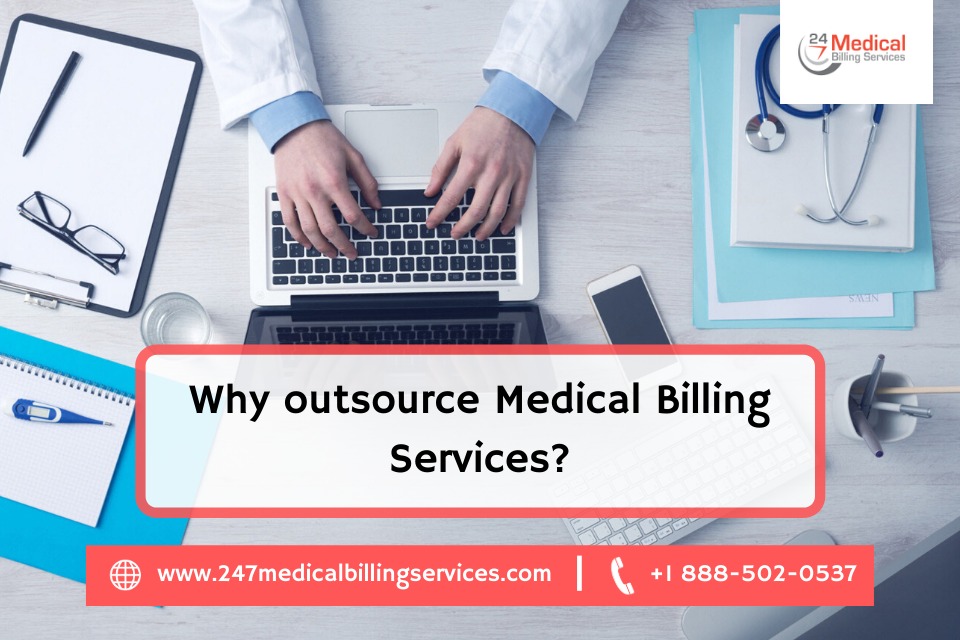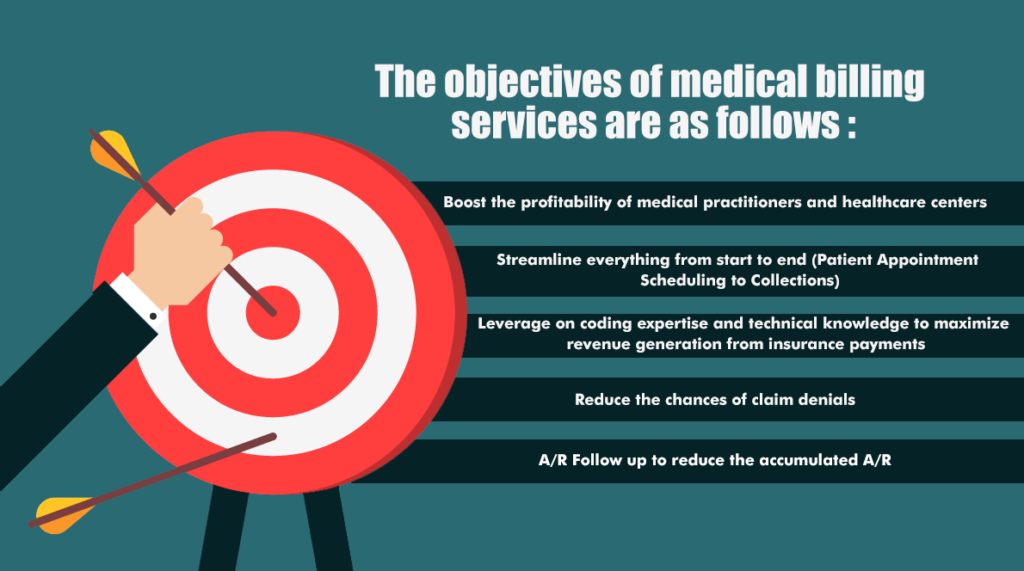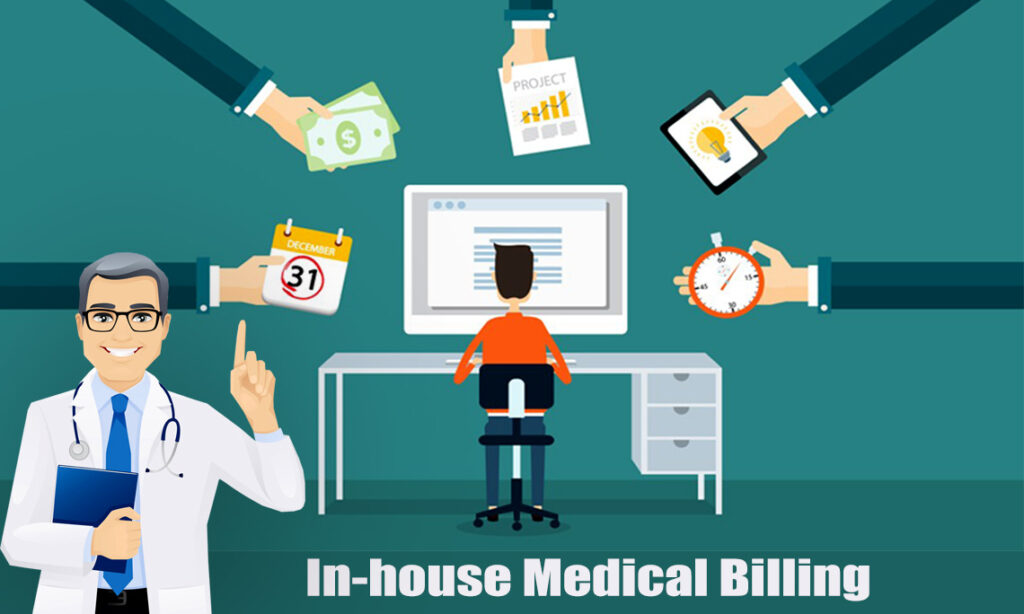Medical Billing Outsourcing
What is Medical Billing?
When it comes to settling payments from insurance companies, medical practitioners, hospitals, and healthcare facilities face a lot of hassles. For the patients, the bill is settled once they provide the details of their insurance at the front desk of the healthcare facility. However, the hospital or healthcare center receives the reimbursements only when the claim is settled by the insurance companies.
Medical billing refers to the process of filing and following up on claims with health insurance companies/providers in order to receive payments for the healthcare services rendered to patients by the practices/physicians. Medical billing serves as an effective channel between medical service providers and insurance companies.
]
Outsourcing Medical Billing Services
Need of Medical Billing Services
With time, as the medical practice scales to new heights and grows, medical practitioners, doctors, and healthcare providers would need to delegate the medical billing task by hiring an in-house team of experts or outsourcing the task to a medical billing service provider.
The objectives of medical billing services are as follows:
- Boost the profitability of medical practitioners and healthcare centers
- Streamline everything from start to end (Patient Appointment Scheduling to Collections)
- Leverage on coding expertise and technical knowledge to maximize revenue generation from insurance payments
- Reduce the chances of claim denials
- A/R Follow up to reduce the accumulated A/R

Common challenges faced by Physicians and Practitioners with Medical Billing
- Lack of quality and effective medical billing resources
- Lack of appropriate tools and techniques to minimize revenue loss
- Staying up-to-date with the latest guidelines
- Inaccurate data entry for patient information
- Frequently changing medical billing codes increase the chances of claim denials
- Old redundant software and the capital investment to upgrade it frequently
- Duplicate charges or multiple billing for a patient
- Late handling of denied or rejected claims
- Delayed claim submissions

Cons of In-house Medical Billing:
In-house billing refers to the process of handling all the medical billing aspects by a medical practitioner's own expert in-house team.
However, keeping everything in-house has a lot of disadvantages.
1) Highly Expensive
Having an in-house medical billing practice involves a lot of capital expenditure and investment in getting a medical billing software and recruiting a team that knows how to operate the software. The cost incurred for recruiting, training, and salaries of the medical billing team would definitely be more than the cost to outsource.
2) Support Issues
A major drawback of having an in-house medical billing team is the ability to provide the required support to the clients. If a limited number of medical billers are hired, it would be difficult to handle a larger client base. On the contrary, having a large team for a limited number of clients means more expense for the business.
3) Liabilities
Having an in-house medical billing team means that they need to be constantly monitored with regards to the security protocols and compliance guidelines followed by them. Any violations of PHI security or protocols can result in huge liabilities for the company. In order to get rid of the liabilities, a lot of cash inflow needs to take place.
Need for Outsourcing Medical Billing Services
Outsourcing medical billing refers to the hiring of an external agency by a healthcare provider who takes care of all the medical billing aspects.
Outsourcing is an effective way to manage medical billing. According to Verified Market Research, the medical billing outsourcing market worldwide was valued at 7.4 billion USD in 2018 and is expected to reach 15.6 billion USD by 2026.
In reality, medical billing can be quite tedious and a time-consuming task for medical practitioners. In order to overcome this, it makes sense for them to outsource the processing of medical claims. This would allow them to free up both time and space, thus enabling them to focus on what they do best, i.e. take proper care of the patients. Choosing the option to outsource limits their liability and helps to save capital in the long term.
Benefits of Medical Billing Outsourcing
1) Boost revenue generation
Medical billing outsourcing helps healthcare providers, especially small practices to collect more money and improve cash flow. This is because the collection rate improves with the timely submission of medical claims. This increases the inflow of reimbursements from the side of the insurance companies.
2) Compliance with ICD-10
The latest version of the International Classification of Diseases (ICD), i.e. ICD-10 is a growing concern in the healthcare and medical industry. The new coding changes as per ICD-10 have resulted in a severe impact on the reimbursements of healthcare providers. Outsourcing medical billing means that compliance regulations and coding changes of ICD-10 will be taken care of by the service provider.
3) Saves money
One major benefit of outsourcing medical billing is that it is cost-effective and helps healthcare providers and medical practitioners save money. The infrastructure, expertise, and procedures, everything comes at a lesser price when outsourced. Thus, outsourcing medical billing is a profitable decision.
4) Improved focus on patients
By outsourcing billing, medical practitioners can spend more time with their patients and offer better services to them. This is because they do not have to look into the medical billing work. More focus and attention to patients means more satisfaction and quality patient care.
5) A/R follow-up
The accounts receivable (A/R) follow-up by the outsourced medical billing company ensures easy recovery of overdue payments from the insurance companies. The A/R follow-up team takes care of the denied claims and reopens them to get the maximum compensation from the insurance companies.
6) Denial management
The main aim of the denial management process in outsourcing medical billing is that it focuses on minimizing the lost reimbursements and denials with highly efficient systems and solutions. The denial management team of the outsourced company works on resolving the problems that lead to denials and strives to cut short the accounts receivables cycle.
7) HIPPA Compliance
While choosing to partner with a medical billing service provider, it is necessary to ensure that the company is HIPPA (Health Insurance Portability and Accountability Act) compliant. An HIPPA-compliant medical billing service provider needs to ensure that all the patient's records and personal information is kept completely secure and confidential. HIPPA compliance requires healthcare entities to ensure complete privacy of patients' sensitive information.
8) Reduced Billing Errors
Outsourcing medical billing services helps medical practitioners to minimize billing errors. The medical billing service provider leverages on various technologies to reduce billing errors. Any medical billing mistake results in loss of reimbursements, thereby affecting the revenue. Medical billing errors can be reduced by ensuring and verifying that all the patient details are correct, investing in training and avoiding duplicate claims.
Why choose 24/7 Medical Billing Services?
- One stop shop solution for all your medical billing needs
- Customized services depending on the nature of your challenge
- Improved cash flow and collection rate of your healthcare center
- Multi-level authentication and security system in place for data security
- Reduced operational costs of your medical center
- Fixed cost for all services with no hidden charges
- Strict deadlines for reimbursements from insurance companies
- CPT and ICD-10 coding compliance eliminates hassles in filing a claim
- Skilled expertise in different domains
- Competitive pricing for all medical billing related services
- Flexible plans depending on your requirements
- Complete transparency for all procedures
- Detailed reporting of your account’s receivables
Free Credentialing
Credentialing is a key step to becoming a trusted medical practitioner and healthcare provider in the list of medical insurance companies in the market. It is essential for healthcare service providers to be a part of the insurance company's network. If they are not a part of the list, many patients may refuse to take treatment.
At 24/7 Medical Billing Services, as a part of an ongoing promotional offer, we are providing free insurance credentialing to doctors, hospitals, and small practices who partner with u as a part of the medical billing services. We verify and update the credentials of healthcare providers with insurance companies at regular time intervals. Credentialing serves as an effective medium to be recognized by insurance companies and get paid by them for the services rendered to patients.


.png)
